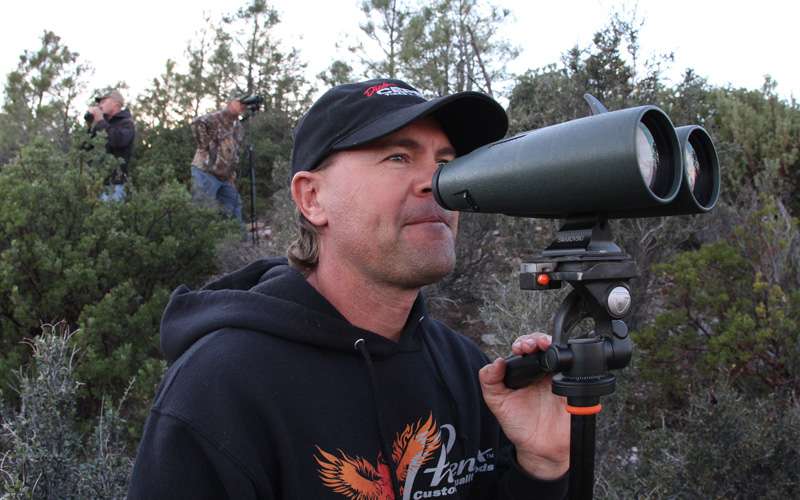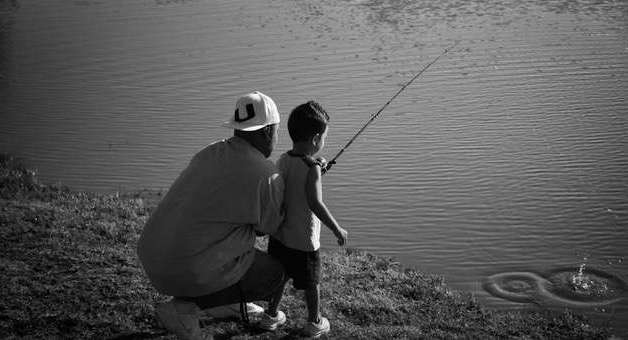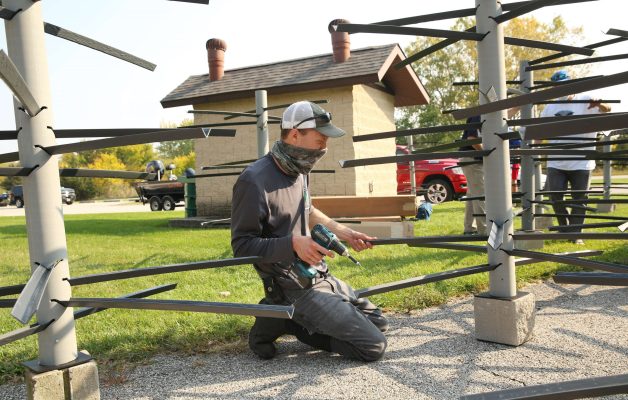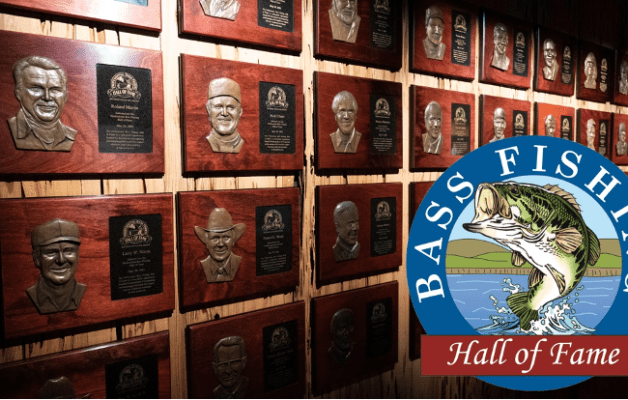
PAYSON, Ariz. – Clifford Pirch understands the words “purple mountain majesties” better than most.
Pirch spends most of his year chasing bass in the relative flatlands of America on the Bassmaster Elite Series. In the fall, he returns to his Arizona mountain home where he spends his time chasing elk and guiding hunters from ridge top to ridge top.
Pirch spends practically every day in the fall watching the sun light up the landscape washing the mountains with purple hues only mountains can have to black once the sun has robbed all the color from the day. The next day he watches as the process is repeated.
“I have a good life,” Pirch said. “I’ve been blessed in so many ways.”
Mountains are the perfect metaphor for Pirch’s life. Blessings come as big as mountains and difficulties follow suit.
The Elite Series angler has dreamed of being a professional fisherman since childhood. In eighth grade, his teacher/coach Max Foster told him he needed to work harder on his Algebra. Pirch’s response: “All I have to do is be able to count to five.”
His father passes on the story fondly, but it wasn’t always viewed that way. In high school, Pirch was a four-time All-State wrestler and All-State cross-country star. While Pirch was accepting his diploma at graduation, it was announced he aspired to be a professional bass fisherman: The crowd laughed.
Four years later as a senior at Northern Arizona University and just months away from a biology degree, a professor laughed again at his aspirations, moving Pirch to quit school and prove everyone wrong.
Where’s the water?
In no way would Payson, Ariz., be viewed as a launching pad for professional angling. The mountain town sits near the Mogollon Rim and is best known as the home away from home of Zane Grey, where the landscape inspired such great novels as Riders of the Purple Sage, West of the Pecos and Under the Tonto Rim.
None of those novels mentioned anything about fishing, especially bass fishing. Outdoorsmen in this part of the world focus their energy on elk or Coues deer. So does Pirch. Professional elk hunters are a dime a dozen here, pro bass guys, not so much.
As a matter of fact, Pirch bought his first bass boat and part of his first truck by gathering and selling shed elk antlers.
“He would have stacks of elk antlers, beyond what I thought was out there,’’ Dennis Pirch, Cliff’s father, said.
The surrounding mindset and geographical isolation created a steep climb for Pirch to break into an industry that is dominated by men who practically live on the water, not surrounded by mountains and arid desert.
“It’s always been a challenge,” Pirch whispered while glassing for elk on a precipice looking over the Tonto National Forest. “But we all have our challenges. You just figure out how to get over them.”
The statement has meaning on multiple levels.
Path to the pros
While many folks laughed at Pirch for wanting to climb out of the mountains to become a professional angler, the jokes have long since passed.
“As parents we were not excited about it, but we honored that,’’ Dennis Pirch said.
Some of his biggest fans now are those who smirked at the idea he would be a professional in the same manner as someone saying, “I’m going to be a Bigfoot hunter.”
Most folks figured him for a hometown boy, living in the hillsides with his wife and two daughters. Others thought he might be a full-time firefighter.
Wild fires are a part of life in Arizona. During his college years, Pirch was a leader of a Helitack Team, subject to be called out to fight those blazes. The team is carried to the blaze by helicopters. They then repel down to the fire and attack it before it gets too big.
Fighting fires was necessary. Fighting fish was where his heart was. He followed the well-worn path of competing in weeknight tournaments, followed by bigger weekend events.
“When I was starting out, Cliff Pirch was the man to beat in Arizona,’’ said Josh Bertrand, Pirch’s roommate on the Elite Series.
Even though Pirch shared a hometown with former Bassmaster pro Mark Kile, not many people gave him much chance to really break out.
He competed in the EverStarts, then to the FLW Tour and in 2013 moved to the Elite Series. He recently qualified for his second straight Bassmaster Classic.
“It seemed like with every one of those series I had to start all over, learn new things,’’ Pirch said.
But he kept working at it. In the process winning three U.S. Opens on Lake Mead, the last one coming in September. The third championship puts him in some elite company: Aaron Martens and Mike Folkstad are the only anglers to ever win that event three times.
When he says he’s still working on becoming a better angler, you get the feeling he won’t ever stop working.
The mountain man
On any given morning during Arizona’s elk season, Pirch has his eyes on everything.
It is opening morning of the state’s second archery season. The rut has dwindled and a youth gun season has just ended. Pirch is guiding seven archers lucky enough to draw a tag from the Arizona Game and Fish Department. They’re positioned through the draws and hollows of the mountains near his home.
In fishing terms this would be a “community hole.” Like in fishing, it gets that title because it produces, but it also gets a lot of pressure.
Ironically, Pirch incorporates a little bass fishing strategy when it comes to elk hunting. In this instance, some of his hunters, including Elite angler Brent Chapman and FLW Champion Darrell Robertson, are going to hunt the area in hopes of picking off a few elk before moving to less-pressured areas.
Pirch has taken up a position in the center of the action, on the highest point, waiting for the mountains to turn purple in the sunlight and elk to start doing what elk do: feeding, drinking and moving about. In front of him is a big set of binoculars on a tripod, his eyes glued to the optics as he watches and waits.
The sun has yet to crest behind him when he notices the first elk, easily three miles away.
“He’s a big six,’’ Pirch whispered in the lingo that denotes a six-by-six or an elk with six points on each antler. “He’s headed toward Darrell.”
The revelation of a trophy elk moving toward one of the hunters created a tremor of excitement. Miles away Pirch was still whispering as if the elk could hear him. Minutes later, dotted across the landscape, there are dozens of elk, their brown hide lighting up in the low-growing Manzanita, brush and pinion pines.
They are not going anywhere in a hurry, but their slow browsing pace headed toward two of Pirch’s hunters was like watching the “play of the day” in slow motion.
Then the community hole became just that.
“Ah-Oh,” Pirch said. “Someone is coming from the other side.”
Every elk on two mountainsides was looking at the same thing, ears perked and not a muscle moving. They stayed that way for 10 minutes while Pirch searched the hillsides for the intrusion. About a mile from us a hunter could be seen picking his way through the brush. He was still two miles from the elk, but they were not having any part of it. All of them picked up and headed straight up the mountain.
The big six followed suit. The hunter, a local out on opening day, never knew he spooked every elk in the valley.
The two hunters the elk were milling toward had no idea how close they came to having a dream come true.
Pirch’s eye in the sky saw everything. The next evening he would watch the big six make a beeline to Darrell Robertson’s stand only to learn that Robertson had left it 15 minutes earlier.
The high and lows of watching the day unfold is nothing new for Pirch. Over the years he has developed an uncanny ability to see elk in a way that defies common sense. A large set of binoculars help. It produces the ability to watch and pattern elk in a way Pirch wishes he could do in bass fishing.
“The thing about Clifford is he’s as good as there is when it comes to understanding and catching pressured fish,’’ said Bertrand. Watching elk “has got to help his instincts. He understands wildlife and fish are wildlife.”
Pirch just wishes others could see how their presence impacts things, whether it’s elk in the mountains or bass in a community spot.
Life challenges
Seeing anything, elk, purple mountains or fish, is something Clifford Pirch doesn’t take for granted: 14 years ago, Pirch was losing his sight.
After a grueling sight-fishing tournament, he fell ill and started losing his vision. Thinking it was caused by too much sight fishing, he went to the doctor hoping it would soon clear up.
But it got worse.
“I lost sight in my left eye,’’ Pirch said. “I couldn’t walk down the hall without hugging the wall.”
He was diagnosed with Multiple Sclerosis, and it would create the biggest challenge of his life.
It’s a part of his life Pirch doesn’t want to talk about, even asking that Bassmaster.com not say anything about it. But he agreed once he realized that his fight could help others in the same proverbial boat.
In the clutches of the disease, Pirch was quickly losing all the things he had fought for his whole life. Friends would help by taking him fishing.
“They would tie me to the butt seat so I wouldn’t fall out,’’ Pirch said. “I couldn’t see well so I couldn’t cast very well with just one eye. But I worked on it.”
He now has sight in both eyes and is considered a top caster on tour.
“He just knows the value of hard work,’’ Dennis Pirch said.
Interestingly, Pirch has never taken medication for the disease.
“I didn’t want to go through that,’’ he said. “A shot a day with no guarantees that it would help.”
Instead, research revealed a young woman in North Dakota who had been confined to a wheelchair by the disease. After changing her diet and lifestyle, she now walks. Pirch followed that course, putting more focus on his faith, trusting that God would bring him through.
“We are told scripturally to not be fearful,’’ Pirch said.
Meanwhile, he is meticulous about his diet, eating blueberries every day along with other nutritional and healthy changes, working to not get fatigued and have his immune system compromised.
“I’ve seen several days when we would practice for 13 hours and I would be wiped out,’’ Bertrand said. “I’d be on the couch just wasted and he would be on the floor doing 100 push-ups.
“He’s a tough cookie.”
On an elk hunt you could see just how tough. While others would be struggling with the thin air and the climbs, Pirch would easily run up and down a mountainside like an elk. He never stopped to catch his breath even though those trailing along couldn’t go 100 yards without stopping.
“He really is an amazing guy,’’ Bertrand said.
……
Today, Pirch is hiding somewhere in the Arizona mountains, watching elk move miles away to hunters he hopes will get the perfect shot, or waiting for a chance at his own elk.
His familiarity with these mountains has created great hunts for clients and friends (Brent Chapman arrowed his first elk, read his account here).
More than that, they have served as metaphors in his pursuit of being a professional angler and fighting a debilitating disease.
For Clifford Pirch every day is just another mountain.





